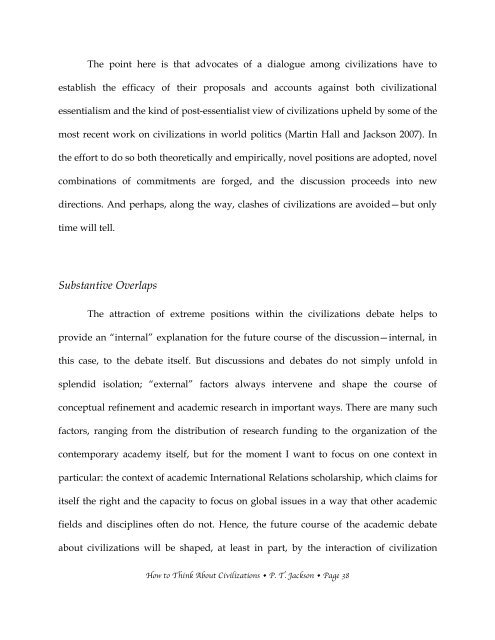How to Think About Civilizations - The Watson Institute for ...
How to Think About Civilizations - The Watson Institute for ...
How to Think About Civilizations - The Watson Institute for ...
Create successful ePaper yourself
Turn your PDF publications into a flip-book with our unique Google optimized e-Paper software.
<strong>The</strong> point here is that advocates of a dialogue among civilizations have <strong>to</strong><br />
establish the efficacy of their proposals and accounts against both civilizational<br />
essentialism and the kind of post-essentialist view of civilizations upheld by some of the<br />
most recent work on civilizations in world politics (Martin Hall and Jackson 2007). In<br />
the ef<strong>for</strong>t <strong>to</strong> do so both theoretically and empirically, novel positions are adopted, novel<br />
combinations of commitments are <strong>for</strong>ged, and the discussion proceeds in<strong>to</strong> new<br />
directions. And perhaps, along the way, clashes of civilizations are avoided—but only<br />
time will tell.<br />
Substantive Overlaps<br />
<strong>The</strong> attraction of extreme positions within the civilizations debate helps <strong>to</strong><br />
provide an “internal” explanation <strong>for</strong> the future course of the discussion—internal, in<br />
this case, <strong>to</strong> the debate itself. But discussions and debates do not simply unfold in<br />
splendid isolation; “external” fac<strong>to</strong>rs always intervene and shape the course of<br />
conceptual refinement and academic research in important ways. <strong>The</strong>re are many such<br />
fac<strong>to</strong>rs, ranging from the distribution of research funding <strong>to</strong> the organization of the<br />
contemporary academy itself, but <strong>for</strong> the moment I want <strong>to</strong> focus on one context in<br />
particular: the context of academic International Relations scholarship, which claims <strong>for</strong><br />
itself the right and the capacity <strong>to</strong> focus on global issues in a way that other academic<br />
fields and disciplines often do not. Hence, the future course of the academic debate<br />
about civilizations will be shaped, at least in part, by the interaction of civilization<br />
<strong>How</strong> <strong>to</strong> <strong>Think</strong> <strong>About</strong> <strong>Civilizations</strong> • P. T. Jackson • Page 38
















